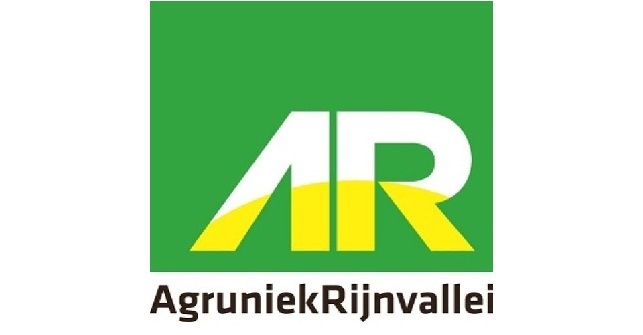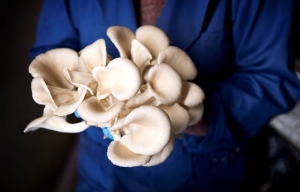picture: Natuurvleescoöperatie Westerkwartier
The province of Groningen has made a subsidy of 27,000 euros available for the new Natural Meat Cooperation Westerkwartier. In addition, 15,000 euros also goes to the cultivation of organic shiitake mushrooms.
The natural meat cooperative is part of the Westerkwartier Area Cooperation. In the natural meat cooperative, ten dairy farmers and five meat farmers are currently working together with the Forestry Commission and the Kroon Meat slaughterhouse in Groningen, says chairman Alex Datema. The farmers bring in bulls that would normally go to veal farming. Most are 50 percent Belgian Blue. They are geostated and slaughtered at the age of two years.
The animals walk either on the cattle farmers' own land or on a 25-hectare site of Forest Commission that the Cooperative uses. That area can still expand. "A lot of natural land is currently being laid out in the Westerkwartier, and in this way they continue to be used for agriculture," he explains.
100 in 2021
Two years ago, in the run-up to the official foundation, farmers already started keeping bulls. The first bulls have already been slaughtered and the quality was good, according to Datema. "We can probably slaughter 40 this year and around 100 next year," he expects.
For selling the meat, the cooperation is now also joining forces with Kroon Meat. The subsidy will be used to further expand the organization and to develop a market concept aimed at regional sales. Groningen farmers who are interested in taking part can register via the cooperations website.
Tree trunks
In addition, the province is investing in shiitake mushrooms as meat substitutes. The company Igro starts working in Tjuchem with the organic cultivation of shiitake. They are commonly grown on straw and sawdust, which has the disadvantage that too many residues are left in the mushroom, according to the province.
Igro wants to grow them on tree trunks from the Forest Commission. Grafting is done with the help of staff from social workplaces. If the method turns out to be effective, this cultivation can become an easily accessible additional form of income with a good yield for arable farmers whoi have some space on their land, according to the province.
Source: Agrio -Veldpost
Click here to the full article and other interesting reads as well
With “Doubleganger and Zwam” sausage rolls, grower Mariëlle van Lieshout from Liessel in the Netherlands wants to encourage consumers to eat more oyster mushrooms. "There are many opportunities, but you have to see them and you have to be patient."
Van Lieshout from Liessel is a busy bee: she has her own oyster mushroom farm, develops innovative ideas for mushroom cultivation with Mobichamp and is a board member of the oyster mushroom association. For the latter, her main motivation is that she wants consumers to eat more oyster mushrooms. The association has a study club to learn from each other in the field of cultivation.
We are trying to develop new products, because only betting on the consumption of fresh oyster mushrooms is not enough. There are many opportunities, but you have to see them and you have to be patient.
RIJP
The entrepreneur has recently joined the RIJP platform developed by farmers, ZLTO and Geodan. The aim is that farm shops, caterers and retail can purchase a diverse package of regional products from farmers from the platform. Such a regional product is the “Doubleganger”, which Van Lieshout came up with together with regional product store 't Streeckhuys in Deurne the Netherlands. It is a hamburger in which half of the meat has been replaced by oyster mushrooms.
“With the Doubleganger belongs the slogan: the only male hamburger that your wife also wants to eat”
Mariëlle van Lieshout, Oyster Mushroom grower in Liessel in the Netherlands
The Doubleganger contains less fat, salt and calories and more fiber and taste than a regular hamburger and is a sustainable and healthy choice without consciously eating less meat," says Van Lieshout. 'We use the following slogan: the only male hamburger that your wife also wants to eat. That fits in nicely with that.
Wider range
All breeders who are members of the oyster mushroom association may market the Doubleganger. "We hope that we can reach a larger audience with a limited marketing budget," says the entrepreneur.
Van Lieshout also stood at the basis of the Zwam sausage roll, with a filling of half oyster mushrooms and half pork. 'An additional advantage is that you can store such products in the freezer for six months, while you can only sell oyster mushrooms fresh. With this, we hope to somewhat offset the peaks and troughs in sales in the future. "
Van Lieshout has also found a new destination for the stalk of oyster mushrooms, normally a residual product. The Eindhoven designer Doreen Westphal from Botanic Bites has been pioneering with tapas, saté and sausage from the stalk since 2016. In 2019 she came up with a variant on shoarma meat: Zwarma.
The grower also implements sustainability in other areas: the straw from the cultivation packages goes back on land as a soil improver and the nursery has 343 solar panels, good for a capacity of 100,000 watt-peak.
PlanetProof
The nursery is PlanetProof certified, but Van Lieshout is not interested in organic certification. 'The demand for organic oyster mushrooms is lower than the supply, so that makes little sense. But if that demand grows and I can get a biological substrate, I want to make the switch. " Most oyster mushrooms end up at retail companies in the Netherlands, Belgium and Germany and can be kept for around a week after purchase.
Companies sometimes offer the entrepreneur their coffee grounds to be processed into the substrate for oyster mushrooms. 'I want to think along with that, but then I also expect something in exchange , for example, that they will sell the Doubleganger or the Zwam sausage roll in their canteens. It must be beneficial for both parties. "
As a daughter of mushroom growers, Van Lieshout had a dream: the mushroom farm of the future. 'A mushroom can grow up to 4 percent per hour and therefore a picker has to make many decisions. With smart software I wanted to make harvesting easier and more automated. " It was not possible to get the financing for the own nursery, but the idea did not let her go.
Harvest guide
Together with two partners, Van Lieshout founded software company Advanced Mushroom Research in 2011. The Harvest Guide, developed by them, measures properties such as diameter, bulging of the hat and structure of the mushrooms above a growing bed. Colored lights on selected mushrooms then give picking advice to the picker.
At Koolen Champignons in Slootdorp there is a test setup of the Harvest Guide. With this the initiators hope to interest mushroom farms all over the world. 'The next step is robotization of the picking process. That is desperately needed, because it becomes more difficult to find and retain harvesting staff, "says Van Lieshout.






















